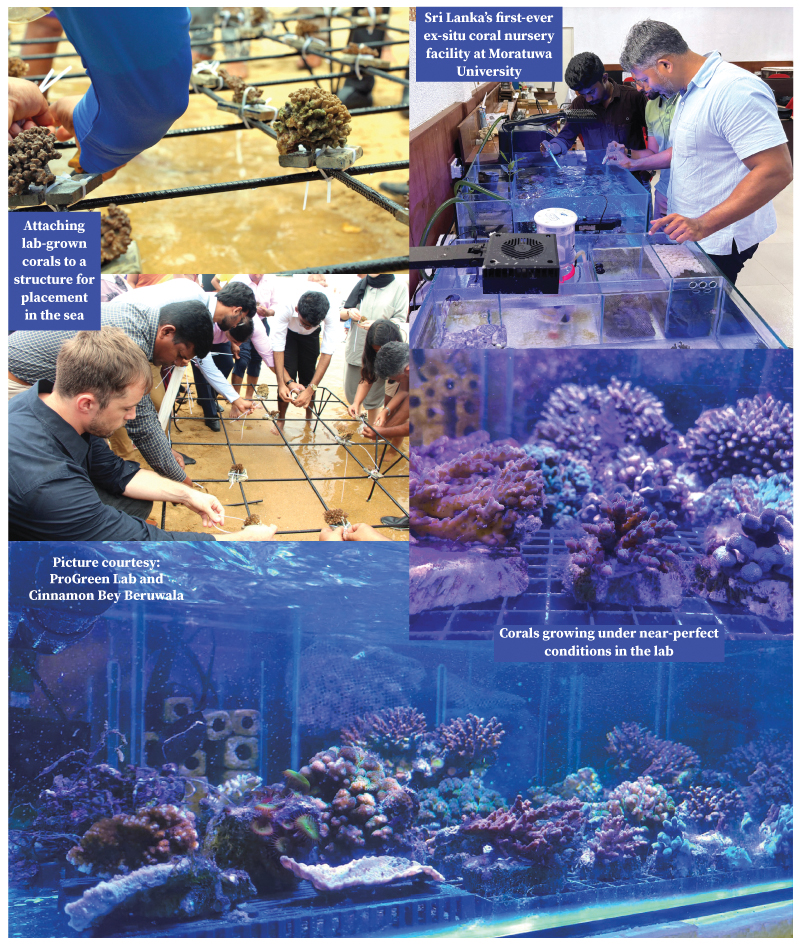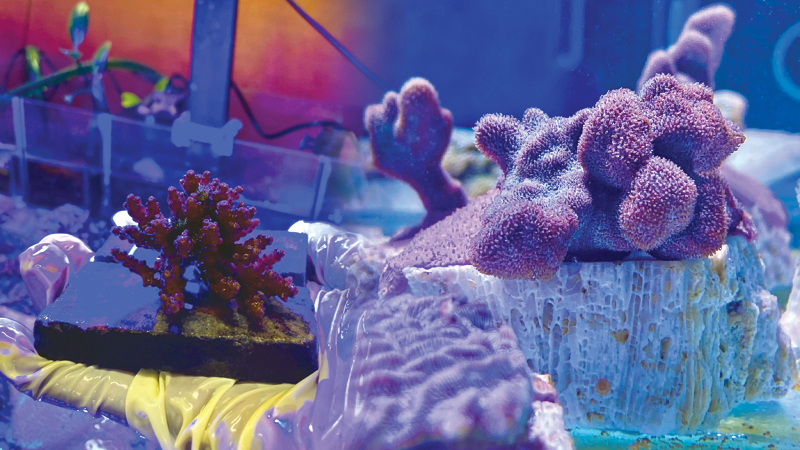Under the ‘Save the Ocean’ Coral Restoration Project in Beruwala, coral fragments collected from the sea are cultivated in a dedicated laboratory at the university called “ProGreen Lab” in controlled conditions where water quality, pH levels, salinity, and temperature are continuously monitored. The plates used for coral planting in the nursery are made from industrial by-products and are custom-designed to mimic natural reef formations while providing stability for coral growth. A coral fragment of about half an inch is artificially grown in the lab for around six months until it reaches 4 to 5 inches before being transplanted to restoration sites.
 In Sinhala, there is a saying: “Okkoma kunu Beruwal bokkata” (all garbage ends up in Beruwala Bay). Setting aside its figurative meaning, this has literally been the reality for decades. Much of the waste carelessly dumped eventually finds its way into the ocean.
In Sinhala, there is a saying: “Okkoma kunu Beruwal bokkata” (all garbage ends up in Beruwala Bay). Setting aside its figurative meaning, this has literally been the reality for decades. Much of the waste carelessly dumped eventually finds its way into the ocean.
With human activities such as pollution, destructive fishing practices, and overfishing on one side, and climate change and invasive species on the other, the toll on sensitive marine ecosystems has been severe. These ecosystems have been degrading at an alarming rate, threatening not only marine life but also the livelihoods of countless people who depend on them.
The Beruwala coral reef, once a vibrant and colourful natural barrier protecting the coastline and supporting local fisheries, has rapidly deteriorated in recent years, like many other coral reefs in Sri Lanka. Battered by multiple stressors, only lifeless coral structures remain on the seabed, serving as haunting reminders of their past glory.
Lab-grown corals
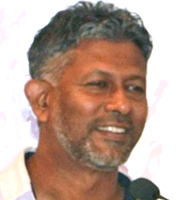
Moratuwa
University
Senior Prof.
Randika Halwathura
Although much of the reef has been damaged, efforts are under way to restore marine biodiversity. A coral restoration project, launched in early 2023 in collaboration with the University of Moratuwa, aims to introduce new coral colonies to revive the ecosystem. This initiative, sponsored by Cinnamon Bey Beruwala and implemented by ProGreen Research Team at the University of Moratuwa, focuses on transplanting lab-nurtured coral fragments to selected restoration sites.
“When I first came to this beach in 1994 as an Ordinary Level student, it was a flourishing reef, but today, it is all dead. Bringing this reef back to life was a dream, but years of hard work and test runs have brought us closer to achieving it,” said Moratuwa University Senior Prof. Randika Halwathura, who leads the project.
He said that poor water quality, mainly due to debris, hinders coral growth in the area.
“When it comes to water temperature and salinity levels, we do not see much of an obstacle, but water quality is a concern. As this is a densely populated area with many hotels, a proper waste management project is needed to control marine debris,” he told the Sunday Observer.
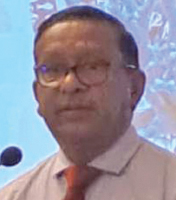
Moratuwa University
Engineering Faculty Dean
Prof. Jagath Manatunge
Under the ‘Save the Ocean’ Coral Restoration Project in Beruwala, coral fragments collected from the sea are cultivated in a dedicated laboratory at the university called “ProGreen Lab” under controlled conditions where water quality, pH levels, salinity, and temperature are continuously monitored. The plates used for coral planting in the nursery are made from industrial by-products and are custom-designed to mimic natural reef formations while providing stability for coral growth. A coral fragment of about half an inch is artificially grown in the lab for around six months until it reaches 4 to 5 inches before being transplanted to restoration sites.
The ProGreen Lab is Sri Lanka’s first-ever ex-situ coral nursery facility, Prof. Halwathura noted, adding that even the Dehiwala Zoo does not have a coral tank.
“Initially, blocks of coral, artificially grown in the lab under near-perfect conditions, are placed in a ‘coral nursery’ in the sea for another five months to help them adapt to the real marine environment. Once they have successfully grown, they are fixed onto the dead coral reef,” the academic explained.
End goal
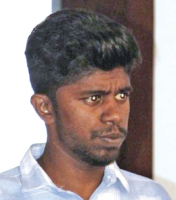
Marine Researcher
at ProGreen Lab,
Chathuska Nadeniya
The project has completed Phase One, which involved site assessments, water quality measurements, regulatory approvals, and the establishment of coral propagation tanks. Phase Two commenced last Tuesday, during which about 80 blocks of lab-grown corals were placed in the sea for adaptation, with the participation of representatives from all stakeholders.
“The end goal of this project is to develop a coral polyp that can withstand climate change and other changes in the environment,” said the senior researcher.
He said that several foreign experts from Australian universities are supporting the endeavour.
Coral reefs are considered among the most biodiverse ecosystems on Earth, often called the “rainforests of the sea”. Coral reefs cover less than one percent of the ocean floor, yet they support a staggering 25 percent of all marine species.
Marine Researcher at the ProGreen Lab, Chathuska Nadeniya said that, according to recent studies, coral reefs are estimated to contribute up to USD 9.9 trillion annually to the global economy, supporting livelihoods and generating economic value through various sectors like tourism, fisheries, and coastal protection.
He said that their project employs innovative techniques such as coral propagation, artificial substrates, and real-time environmental monitoring to restore these fragile ecosystems. He added that the lab-cultivated corals transplanted onto the Beruwala Reef last year have grown well as of today.
“We are conducting a comprehensive biodiversity assessment as there has been less research on the Beruwala Reef. Community support in the area is vital to our project,” he said.
Win-win collaboration
Moratuwa University Engineering Faculty Dean Prof. Jagath Manatunge, citing recent studies, said that nearly 50 percent of coral reefs around the world have been lost in the past three decades alone.
“Sri Lanka’s coral reefs are not immune to this global reality. Our tourism sector significantly depends on the health of the coastal and marine systems. Globally, coral restoration projects have proven successful. For example, coral nurseries and transplantation programs in the Great Barrier Reef, Australia, as well as in the Maldives and Indonesia have yielded successful results.
“We are a leading engineering institution, but cover non-engineering aspects as well because engineering applications are everywhere. The University is committed to environmental sustainability, and is eager to collaborate with responsible corporate partners in this endeavour. Our goal is not only to restore coral reefs but also to rekindle hope and promote sustainable livelihoods connected to marine biodiversity,” said Prof Manatunge.
He said that the collaboration between Moratuwa University and Cinnamon Bey Beruwala creates great synergy, a genuine win-win situation. “Universities contribute rigorous scientific research, innovative methodologies, and expert knowledge, while corporate partners provide practical insights and financial assistance,” he added.
Cinnamon Bey Beruwala Sustainability and CSR Operations Manager Malsha Samarasekara said in addition to financial contributions, the Resort has been actively raising awareness among its guests, staff, and the wider community, advocating for responsible tourism and environmental stewardship.
Speaking at the event, Wildlife Conservation Department Director General Ranjan Marasinghe extended the Department’s full support for the project.
